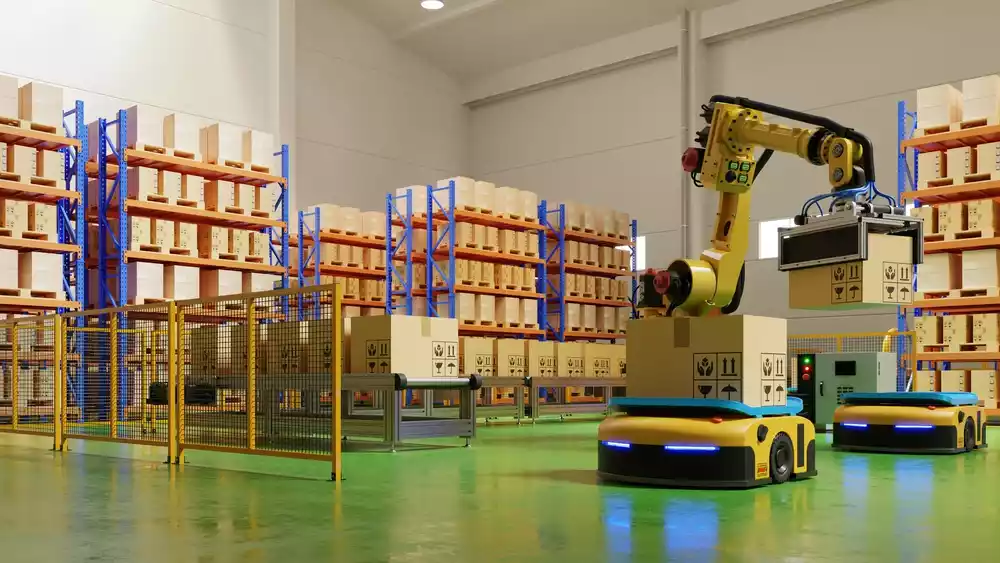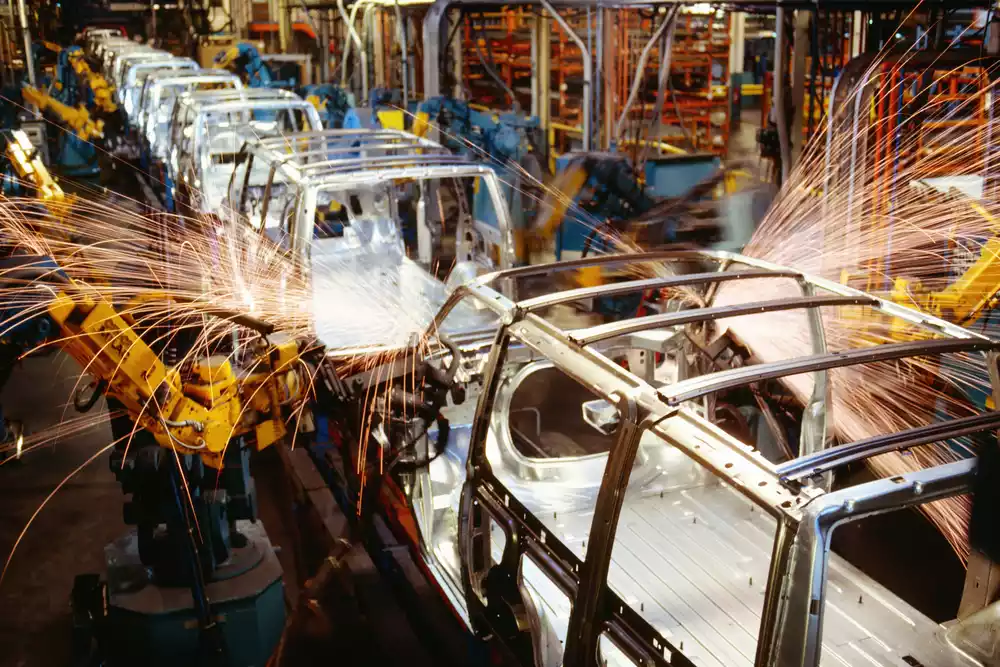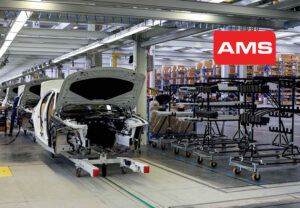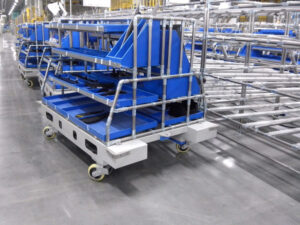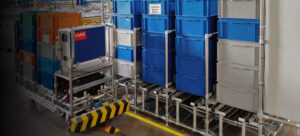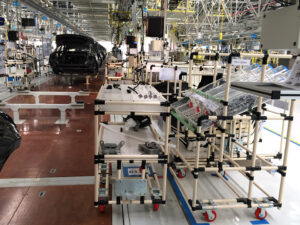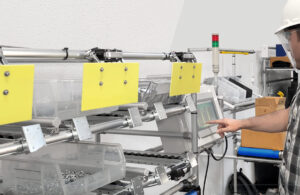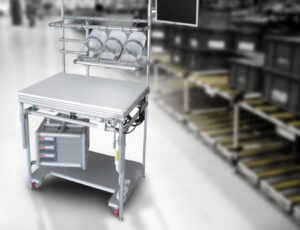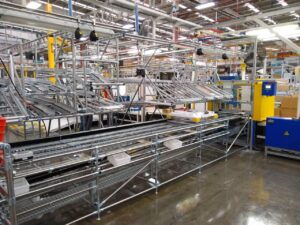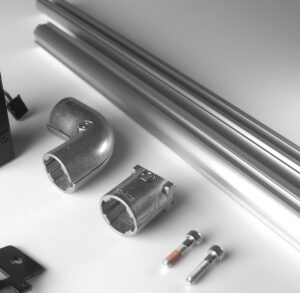Types of Industrial Robots and How to Identify Them
Table of contents
Types of Industrial Robots and How to Identify Them
Industrial robots have become the backbone of modern manufacturing, transforming operations in a myriad of industries. With capabilities ranging from material handling to spot welding, these machines handle tasks such as assembly and pick-and-place operations with unparalleled efficiency. The advent of robotic automation has not only enhanced productivity but has also redefined the parameters of manufacturing precision and flexibility.
The World of Industrial Robots
At the heart of every industrial robot lies a sophisticated combination of electric motors and a reliable power supply. These fundamental components provide the necessary movement and strength for robots to carry out their functions. Understanding this core mechanism is essential for grasping how robots transform electrical energy into mechanical action, driving the automation of manufacturing tasks.
The Evolution of Industrial Robots
Since their inception, industrial robots have undergone significant transformations, driven by advancements in electric motors and power supply technologies. These improvements have enabled robots to operate with greater efficiency and reliability. As a result, robots have expanded their presence across various sectors, becoming integral to the automation of production lines and the execution of precision tasks.
Navigating Through the Fourth Industrial Revolution
The fourth industrial revolution has ushered in a new era of manufacturing, where the power supply technology plays a critical role in the functionality of industrial robots. This era is characterized by a fusion of advanced production and information technologies, leading to unprecedented levels of automation and connectivity. As robots become more sophisticated, their contribution to industry 4.0 continues to grow, heralding a future where they are central to manufacturing innovation.
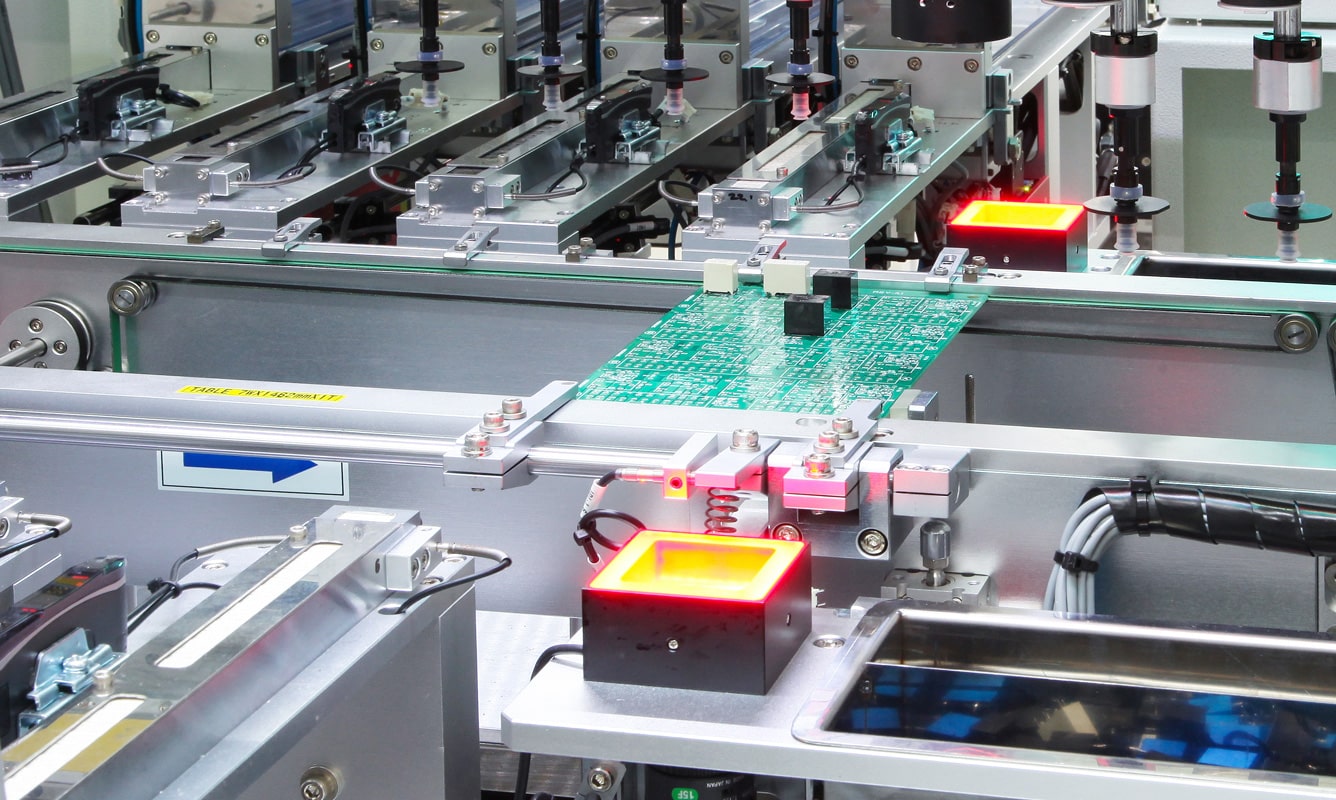
The Diverse Landscape of Industrial Robotics
Articulated Robots
Articulated robots, known for their flexibility and range of motion, have become indispensable in the automotive industry. They excel at spot welding and are crucial in manufacturing processes, performing applications such as assembly with a high degree of precision. Their design allows for a significant payload capacity, making them versatile tools in various production scenarios.
SCARA Robots
SCARA robots have carved a niche for themselves by specializing in high-speed pick-and-place operations. Their unique configuration makes them ideal for tasks requiring fast, repetitive movements. This capability has made them a popular choice for assembling small components, showcasing their importance in industries focused on precision and efficiency.
Cartesian Robots
Cartesian robots stand out for their accuracy and repeatability, characteristics attributable to their linear movement system. Often referred to as gantry robots, they are a variant of articulated robots tailored for tasks where precision is paramount. Their structured design is particularly well-suited for applications that demand meticulous positioning, such as in CNC machinery operations.
Delta Robots
Delta robots are renowned for their ability to perform pick-and-place operations with exceptional speed and accuracy. Their design allows for rapid and repetitive actions, making them perfect for tasks that require agility and precision. This makes delta robots invaluable assets in environments where time and accuracy are critical factors.
Polar Robots
Polar robots, also known as spherical robots, offer a unique combination of rotational and linear movements, allowing them to access a wide range of positions. This versatility makes them suitable for a variety of applications, from assembly tasks to material handling, where flexibility and reach are essential.
AMR Robots
AMR robots, standing for Autonomous Mobile Robots, represent a groundbreaking advancement in the field of industrial automation. These robots are designed to navigate autonomously in dynamic environments, equipped with advanced sensors and navigation systems that enable them to perceive and respond to their surroundings in real-time. Their ability to map out environments, avoid obstacles, and plan efficient routes makes them invaluable for a wide range of applications, from logistics and warehousing to healthcare and retail. AMRs enhance operational efficiency, reduce costs, and free up human resources for more strategic tasks, making them indispensable assets in modern industrial settings.
Collaborative Robots
Collaborative robots, or cobots, represent a significant shift from traditional industrial robots. Endorsed by the International Federation of Robotics, cobots are designed to work alongside humans, enhancing safety and efficiency. Their introduction has opened up new possibilities for automation, where robots and human workers can complement each other’s strengths.
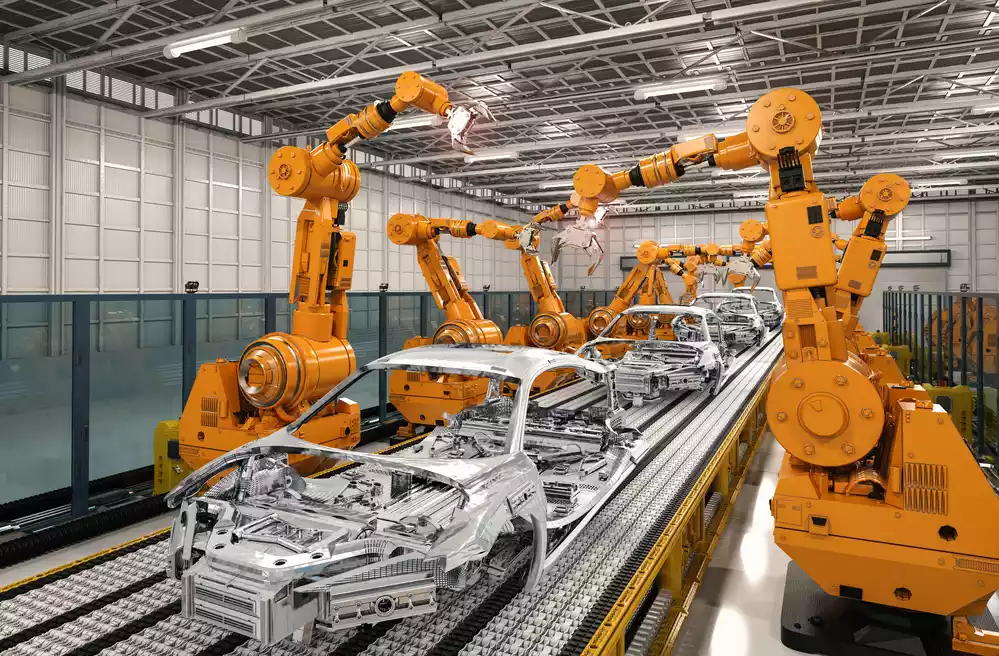
Types of Industrial Robots at Work
The different types of industrial robots have become indispensable in modern manufacturing, taking on a variety of roles that range from assembly to quality control. Their ability to perform repetitive tasks with high precision and speed has revolutionized production lines, making processes more efficient and reliable.
Automotive Manufacturing
In the automotive industry, industrial robots are utilized extensively to streamline manufacturing processes. Their application ranges from welding and painting to assembly and inspection, ensuring both efficiency and quality. Robots in automotive manufacturing not only boost productivity but also enhance the safety of the workplace by taking on hazardous tasks, thereby reducing the risk to human workers.
Aerospace Manufacturing
Aerospace manufacturing demands a high degree of accuracy and precision, making industrial robots invaluable to the sector. These robots engage in tasks such as drilling, riveting, and component assembly, where precision is critical. The use of robots ensures consistent quality and adherence to stringent industry standards, highlighting the crucial role automation plays in the aerospace sector’s advancement.
Electronics Manufacturing
Electronics manufacturing relies heavily on robots to handle delicate components with precision and care. From assembling printed circuit boards to conducting quality inspections, these types of industrial robots enhance productivity while ensuring a high degree of accuracy and repeatability. This allows manufacturers to meet the growing demand for electronics with efficiency, reducing the reliance on manual labor and minimizing the risk of errors.
Metal and Plastic Manufacturing
Industrial robots are pivotal in metal and plastic manufacturing, where they perform tasks ranging from cutting and welding to injection molding and extrusion. Their ability to operate with precision and consistency ensures high-quality products, while also speeding up the manufacturing process. Robots in this industry adapt easily to different materials and tasks, showcasing their versatility and importance in modern manufacturing.
Material Handling
Material handling is a critical application of industrial robots, designed to reduce the risk of injury associated with manual labor. Robots efficiently move, sort, and organize materials, enhancing safety and productivity in the workplace. Their use in material handling not only streamlines operations but also allows for the optimization of storage and logistics, demonstrating the multifaceted benefits of automation in manufacturing.
Welding and Soldering
Robots bring precision and speed to the forefront in welding and soldering applications. Their ability to consistently perform tasks with high accuracy reduces the likelihood of defects, ensuring superior quality welds and joints. This level of precision, combined with the speed of robotic operations, significantly boosts production rates, making robots invaluable assets in manufacturing environments where welding and soldering are critical.
Painting and Coating
The application of paint and coatings benefits greatly from the precision and efficiency of industrial robots. These types of industrial robots ensure even application, reducing waste and ensuring consistency across products. Their ability to operate in hazardous environments, such as those with volatile chemicals, further underscores the safety advantages of using robots for painting and coating tasks in manufacturing processes.
Quality Inspection
In the realm of industrial robots, quality inspection stands as a critical application, ensuring product standards meet rigorous criteria. Industrial robots equipped for these inspection tasks leverage advanced vision systems and sensors to detect defects with unparalleled precision and consistency. This automation not only accelerates the inspection process but also significantly reduces the margin for error, leading to higher quality products reaching the market faster.
Machine Tending
Machine tending, a process integral to manufacturing, has seen substantial improvements through the integration of different types of industrial robots. These robots efficiently load and unload materials from machines, working in tandem with conveyor belts to streamline production workflows. This automation not only optimizes cycle times but also minimizes human intervention, thereby reducing the risk of injury and enhancing overall productivity.
The Advantages and Challenges of Industrial Robots
Industrial robots revolutionize manufacturing by mitigating the risk of injury, optimizing robotic systems, and efficiently handling raw materials. However, the journey of integrating an industrial robot system into production lines presents its unique set of challenges and opportunities.
Increased Productivity
The introduction of industrial robots into the manufacturing sector has significantly boosted productivity. These robots work tirelessly, performing tasks with speed and precision that far exceeds human capability. By automating repetitive and labor-intensive jobs, companies can achieve more in less time, leading to a substantial increase in output and efficiency.
Precision and Repeatability
One of the hallmark benefits of industrial robots is their ability to execute tasks with exceptional precision and repeatability. Whether it’s assembling intricate components or applying paint with exact consistency, robots maintain a level of accuracy that is virtually unmatched. This consistency ensures high-quality products, reducing waste and rework costs.
Speed and Safety
Industrial robots excel in combining speed with safety, performing tasks at high velocities while minimizing the risk of workplace accidents. Their design allows them to operate in hazardous environments and handle dangerous materials, safeguarding human workers from potential harm. This dual advantage streamlines operations and fosters a safer working environment.
Reduced Operating Costs
Implementing robotic automation in manufacturing processes significantly reduces operational costs over time. While the initial investment might be substantial, the efficiency and speed of robots decrease production times and labor costs. Moreover, the precision of robots reduces material waste, further cutting expenses and enhancing sustainability in manufacturing practices.
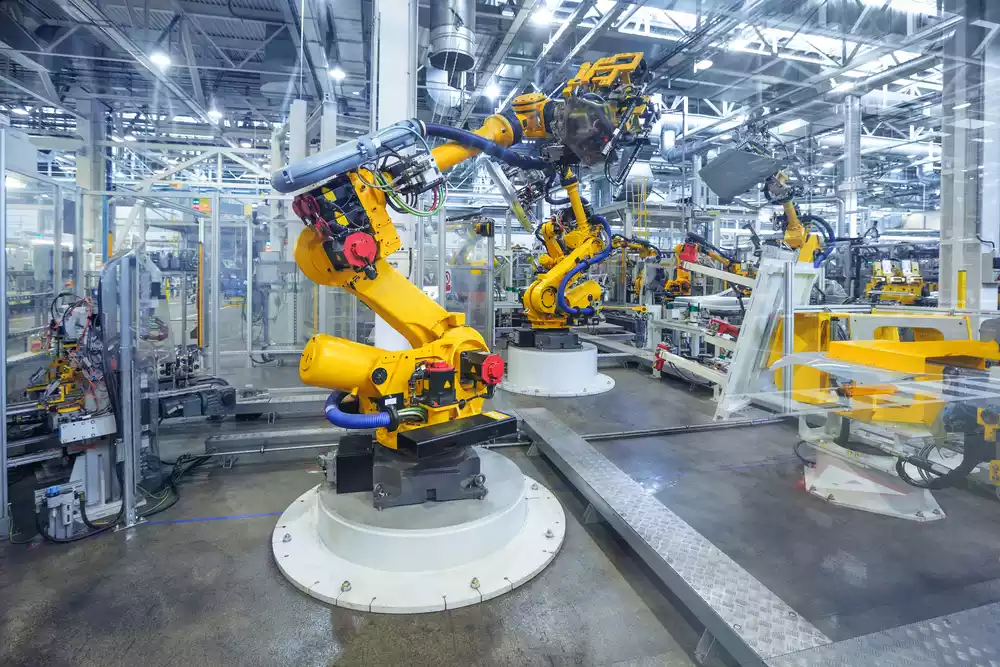
Revolutionize Your Manufacturing Processes with the Right Robotic Solutions
Understanding the various types of industrial robots is crucial for businesses in the manufacturing sector. Each type offers unique capabilities and advantages, by identifying the right type of robot for specific tasks, companies can enhance efficiency, productivity, and overall operational performance.
Are you ready to revolutionize your manufacturing processes with the right industrial robot? Contact AMS, Inc., today to explore our range of robotic solutions and find the perfect fit for your business needs. Maximize efficiency, minimize downtime, and stay ahead of the competition with AMS, Inc. Let’s transform your production line together!
We look beyond the scope to surpass your expectations
We understand the importance of retaining a strong working relationship with our customers. AMS provides a niche for everyone through excellent customer care and top-rank products.

